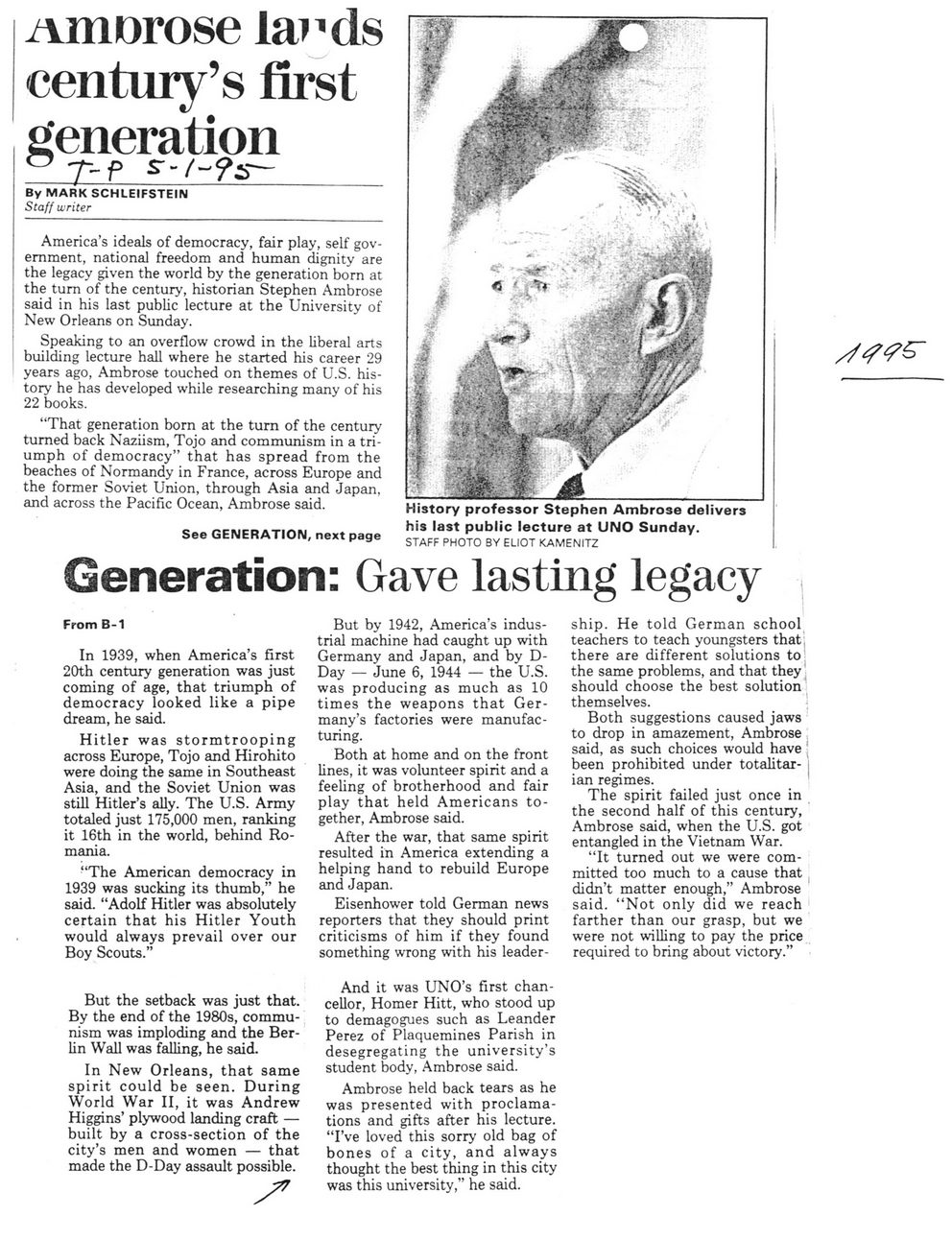This text was obtained via automated optical character recognition.
It has not been edited and may therefore contain several errors.
.vmurose lands century?s first generation ? T-P s~ By MARK SCHLEIFSTEIN Staff writer America?s ideals of democracy, fair play, self government, national freedom and human dignity are the legacy given the world by the generation born at the turn of the century, historian Stephen Ambrose said in his last public lecture at the University of New Orleans on Sunday. Speaking to an overflow crowd in the liberal arts building lecture hall where he started his career 29 years ago, Ambrose touched on themes of U.S. history he has developed while researching many of his 22 books. ?That generation born at the turn of the century turned back Naziism, Tojo and communism in a triumph of democracy? that has spread from the beaches of Normandy in France, across Europe and the former Soviet Union, through Asia and Japan, and across the Pacific Ocean, Ambrose said. See GENERATION, next page History professor Stephen Ambrose delivers his last public lecture at UNO Sunday. STAFF PHOTO BY ELIOT KAMENITZ Generation: Gave lasting legacy From B-1 In 1939, when America?s first 20th century generation was just coming of age, that triumph of democracy looked like a pipe dream, he said. Hitler was stormtrooping across Europe, Tojo and Hirohito were doing the same in Southeast Asia, and the Soviet Union was still Hitler?s ally. The U.S. Army totaled just 175,000 men, ranking it 16th in the world, behind Romania. ?The American democracy in 1939 was sucking its thumb,? he said. ?Adolf Hitler was absolutely certain that his Hitler Youth would always prevail over our Boy Scouts.? But by 1942, America?s industrial machine had caught up with Germany and Japan, and by D-Day ? June 6, 1944 ? the U.S. was producing as much as 10 times the weapons that Germany?s factories were manufacturing. Both at home and on the front lines, it was volunteer spirit and a feeling of brotherhood and fair play that held Americans together, Ambrose said. After the war, that same spirit resulted in America extending a helping hand to rebuild Europe and Japan. Eisenhower told German news reporters that they should print criticisms of him if they found something wrong with his leader- ship. He told German school teachers to teach youngsters that, there are different solutions toj the same problems, and that they j should choose the best solution themselves. Both suggestions caused jaws to drop in amazement, Ambrose j said, as such choices would have been prohibited under totalitarian regimes. 1 The spirit failed just once in the second half of this century, Ambrose said, when the U.S. got entangled in the Vietnam War. ?It turned out we were committed too much to a cause that didn?t matter enough,? Ambrose said. ?Not only did we reach farther than our grasp, but we were not willing to pay the price required to bring about victory.? But the setback was just that. By the end of the 1980s, communism was imploding and the Berlin Wall was falling, he said. In New Orleans, that same spirit could be seen. During World War II, it was Andrew Higgins? plywood landing craft ? built by a cross-section of the city?s men and women ? that made the D-Day assault possible. S And it was UNO?s first chancellor, Homer Hitt, who stood up to demagogues such as Leander Perez of Plaquemines Parish in desegregating the university?s student body, Ambrose said. Ambrose held back tears as he was presented with proclamations and gifts after his lecture. ?I?ve loved this sorry old bag of bones of a city, and always thought the best thing in this city was this university,? he said.

Ambrose, Stephen Times-Picayune-5-1-95